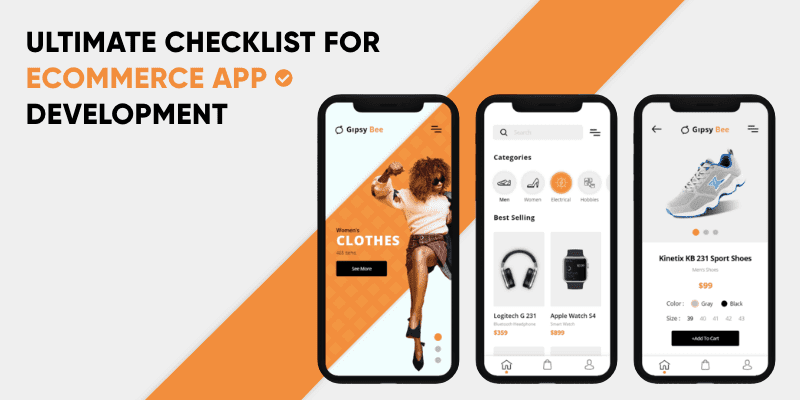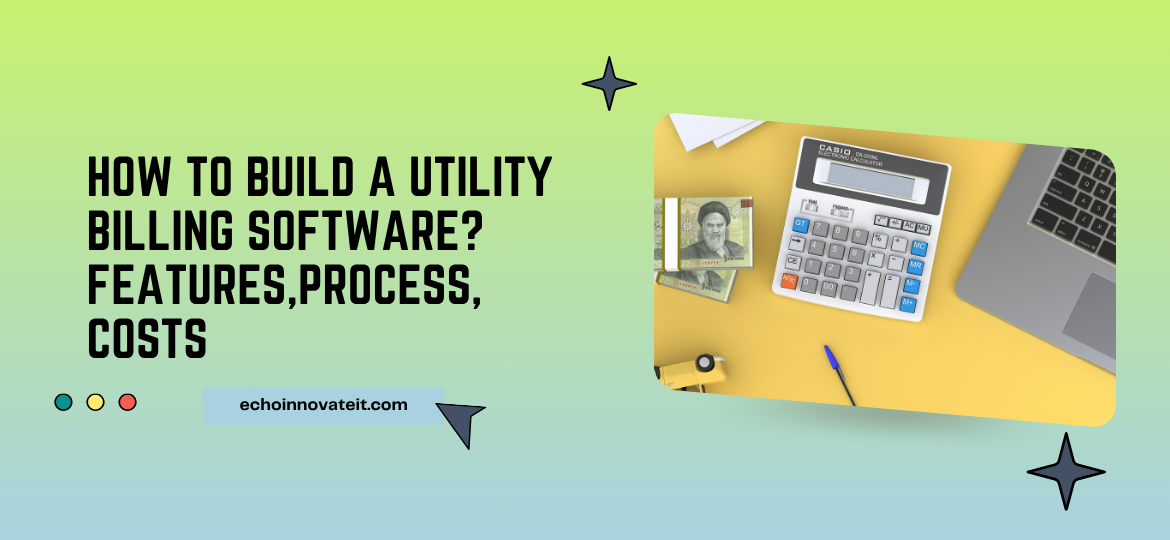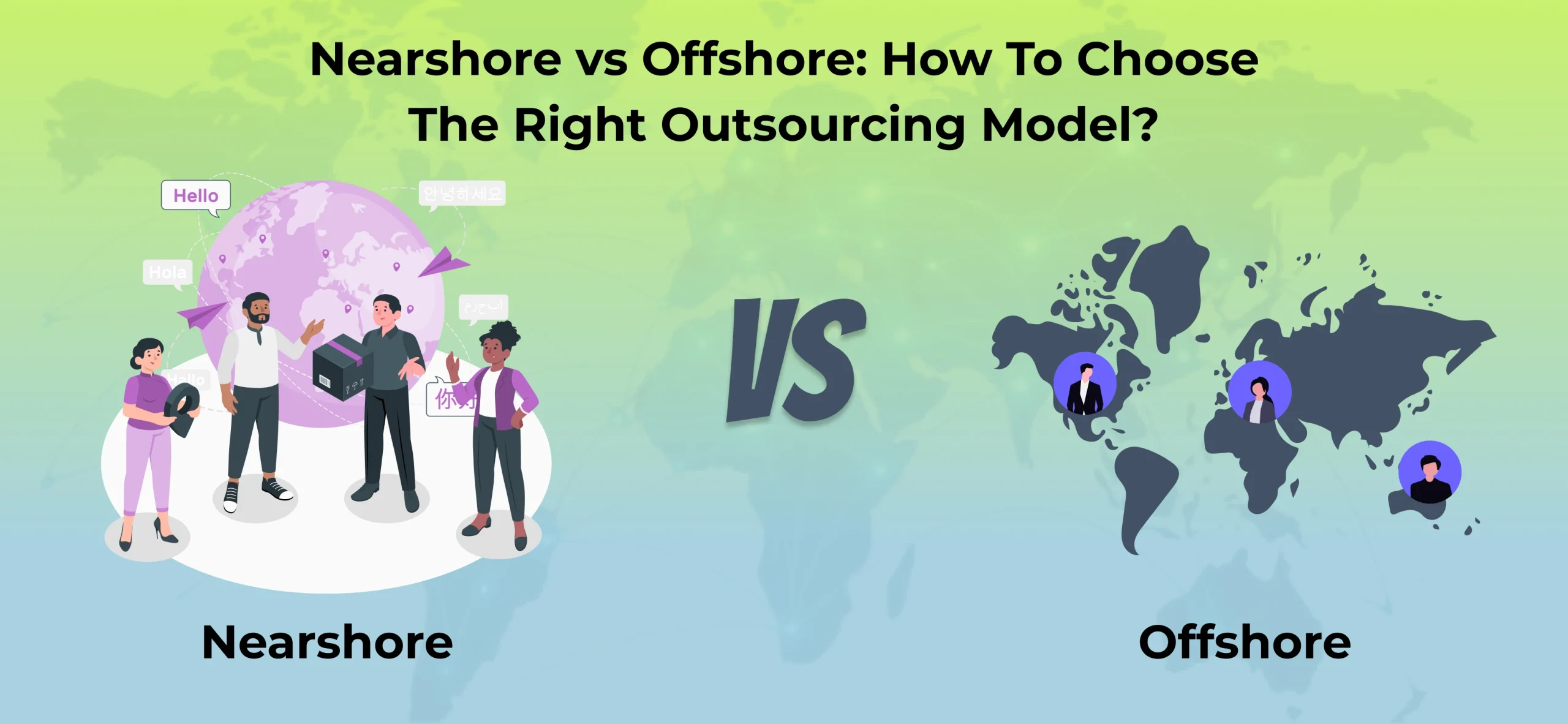Before you begin your brand new eCommerce app development and designing, you should be aware that there are numerous factors to consider. In order for your clients to have a wonderful user experience. Every functionality on your eCommerce store should be thoroughly reviewed and tested across all platforms and devices.
Only when every aspect, from sleek designs to check-out modules, is built to perfection will your eCommerce store be able to meet the expectations of your target audience. If you don’t perform all of these things, buyers will perceive you as untrustworthy, since they will encounter broken links, incomplete product page content, and inconvenient checkouts. We’ve created an eCommerce app development checklist to provide you with comprehensive help.
Before you make a sale through your eCommerce business, use this checklist as a roadmap to success. It enables you to easily construct the optimal interface and a visually appealing store.
Let’s have a look at a comprehensive checklist that you may save to your browser for future use.
Why Should You Have An ECommerce App For Your ECommerce Website?
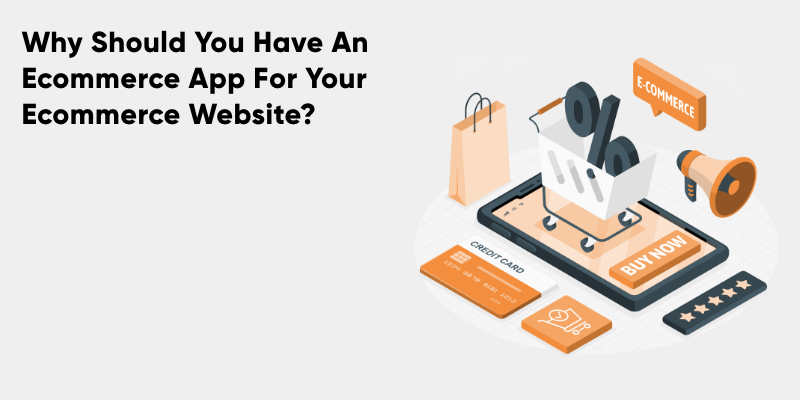
Let’s take a look at what drives people to eCommerce app development and why you should consider developing one for your business.
Shoppers prefer apps to mobile browsers
The benefits of mobile apps over responsive websites in mobile browsers have been debated numerous times. The superiority of apps over browsers is undeniable: 78 percent of users polled said they would prefer to use a mobile app than a mobile browser to access a store.
It’s not surprising that people prefer smartphone apps. Ecommerce applications like Wallapop are far more convenient to use while buying, especially if you aren’t visiting an eCommerce store for the first time. To begin, there is no need to memorize a URL or log in to use the shop. In addition, as compared to a mobile browser, applications give better security and speed.
However, the decline in browser-based online Video shopping isn’t the only reason you should create an eCommerce app for your business.
Mobile eCommerce apps boost customer loyalty
People that download your mobile app show a higher level of loyalty to your brand at first. They come prepared to buy, but visitors to your mobile site are more inclined to double-check facts or check-up contact information. Customers also spend three to four times as much time on apps as on mobile websites, and they do it on purpose.
Consider this: clients are more likely to consider ordering from you if they have an icon for your online store on their phones. Because reminders are continually operating on a subconscious level, your store will pop up in their brains when they’re thinking about their next buy.
As per the Criteo data, buyers who use your mobile app are twice as likely to return to your store within 30 days as those who use a mobile browser.
Reduced response time
The performance of a website or an app is a primary issue for any internet user. Because mobile apps store their data largely on a mobile device, the time it takes a mobile app to complete an action is significantly shorter than that of a website. Although apps and websites link to servers, the amount of data exchanged between a server and a mobile application is ten times less than between a server and a browser. As a result, applications can obtain data considerably more quickly.
Furthermore, users can define their default settings in apps, allowing the application to load only the data that the client desires. Users can be more proactive and save time as a result of this.
Enhanced UX
Your customers’ perception of your store can make or break your sales. Users expect simple navigation while visiting a website in order to find what they’re looking for. Mobile apps are limited in terms of layout, which might work in your favor.
To be more specific, the lack of unnecessary buttons and banners in your store’s layout on mobile devices might lead to a more enjoyable user experience. Customers will remember how simple it is to make purchases in your eCommerce app if there are no distractions. This will help them get to the checkout faster and return more often.
Increased conversion rates
Conversion rates are high thanks to a pleasing user experience, simple navigation, and usability. In comparison to desktop and mobile websites, mobile applications enhance the percentage of users that perform the desired action, according to Criteo’s research.
As a result, eCommerce app conversion rates are three times higher than mobile website conversion rates and 1.5 times higher than desktop site conversion rates. Furthermore, due to enhanced item display, clients who reach your business through an app are likely to view 4.6 times as many products as they would in their mobile browsers. Finally, the average order value in apps is 140 percent greater than on mobile sites and 130 percent higher than on desktop sites.
Lower mobile shopping cart abandonment rate
Shopping cart abandonment is a serious issue in eCommerce. It’s one thing to persuade clients to add things to their shopping carts; it’s quite another to get them to complete the checkout process. The average rate of incomplete purchases, according to Baymard, is 69.23%. There are several ways to combat these difficulties within your eCommerce store, but establishing an eCommerce app can help you drastically minimize the number of clients that leave.
Mobile applications have much lower cart abandonment rates due to the simpler checkout process. The system saves shipping and payment information, allowing users to make transactions with only one click. This allows customers to complete the checkout process faster and with fewer interruptions.
Furthermore, individuals who visit a store to look but do not know what they need do not complete transactions. This practice is promoted more by the desktop version of your website than by mobile apps. Customers who access your store through an app are likely to have made up their minds and are ready to buy.
When Is The Right Time To Build An App?
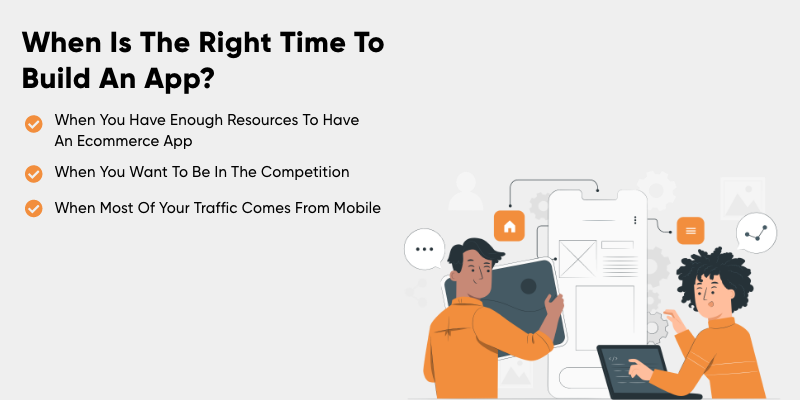
When you have enough resources to have an eCommerce app
Don’t go into big debt to construct an app unless you’re sure this will play a critical role in growing your eCommerce business and generating new revenue. Continue to focus on your current customer base and expand your web platform to attract the right customers. When you have the resources, create a business case, and then invest in a mobile app when you’re ready to launch and have the resources to bring on the right people.
The costs will vary depending on whether you want to outsource or construct your app in-house.
When you want to be in the competition
If you opt to wait until a mobile app is a requirement, you’ll be so far behind that catching up will be nearly impossible.
Businesses who built websites early on and gave their customers a new way to buy were considerably more likely to succeed than those that stayed traditional.
Sears Canada is an excellent example. They have a reputation for being slow to adjust to market changes. As a result, they’ve just announced that they’re shutting down completely. While there are probably other factors that come into play, Sears continued to focus their efforts on the in-person, in-store sales process after the traditional buying experience was transferred online due to the likes of Amazon. Clearly, things didn’t turn out as they had intended.
When most of your traffic comes from mobile
If mobile is beginning to account for the majority of your website traffic, it’s time to invest in a mobile app. Customers have told you that they prefer to purchase on their phones, which should make developing an app a lot easier.
Why? Customers and potential customers will not be as resistant as they would be if they were used to purchasing on a Computer. They already shop on their phones; all you’re doing is enhancing and simplifying that experience.
You’re squandering money if you gain mobile traffic but don’t capitalize on it over time with push notifications and targeted sales.
What A Mobile App Can Do For My Ecommerce Store?
Of course, the sector isn’t changing just to change. Your company’s development potential is enormous with a mobile app. You will have far more influence over your consumers’ experience when they purchase on your app than when they shop on your website.
One can send push notifications about specific product sales based on each customer’s past purchases, rather than hoping they visit your website and see your banner ad or pop-up box advertising a generic deal. Also, you get to optimize your sales potential since you control the playing field.
Importance Of Having An Ecommerce App For Your Business

For Brand Recognition
Brands and customers have a strong bond through mobile apps. Mobile apps remain on customers’ devices indefinitely, causing them to choose your brand every time they require a service or purchase a product. When a customer is pleased with your service, they are likely to provide a review on social media and other platforms. This is a fantastic opportunity to promote the brand, improve its reputation, and attract new customers. Customers would want to shop from your business on a regular basis if you provide excellent service with attractive discounts and offers. It proves to be incredibly useful for business owners in the growth of the brand with the consistent business.
Because most customers spend hours on their phones, it’s simple for brands to engage with them with a mobile e-commerce app. A brand, on the other hand, must create a high-quality, smooth mobile app experience that customers enjoy. Because users on mobile devices are prone to be irritated quickly, and according to Statista, 32% of app users will uninstall a mobile app if it isn’t user-friendly. As a result, integrate strategic branding approaches with appealing and user-friendly UI/UX designs to leave a lasting impression on mobile users. Additionally, to improve the effectiveness of your mobile eCommerce app branding, you must answer every client’s inquiries.
For the easy checkout process
The checkout process is the series of steps a customer takes on an eCommerce business to purchase the products in their shopping cart. This includes every step a customer takes to reach the checkout page. A perfect checkout flow will provide a frictionless customer experience.
Improve marketing communication
Almost every business spends a significant amount of money on marketing. While an eCommerce mobile app for your business won’t let you down in terms of sales, this platform goes above and beyond. You’ll be able to create even more income from your present and future customers by fine-tuning your PPC marketing campaigns. If you don’t have a mobile eCommerce app, you’ll have to rely on your customers going straight to your website to get any conversions. However, how often does the same consumer return to your website? Even your most devoted consumers are unlikely to purchase something every day or every week.
To reach your customer base through extra channels, you spend marketing expenditures on social media marketing campaigns and email communication. However, with the help of an eCommerce mobile app, you’ll be able to engage with your clients more effectively and efficiently via push notifications. Push notification features display alerts on the user’s mobile app’s home screen. When a user accesses it, he will be taken immediately to the app, where he will receive all of the necessary marketing content and be encouraged to make a purchase. Push notifications are a useful and effective way to reach out to customers and increase sales.
To reduce the responding time
Customers and business owners alike want a service that works flawlessly. When compared to a website, the reaction time for a mobile app to complete an activity is significantly less because mobile apps retrieve data quickly. Mobile apps often connect to servers in the same way that websites do, however, data transmission between a mobile app and a server is substantially lower than between a browser and a server. This is due to the fact that mobile apps save data on the device in part. Additionally, app users have the option of selecting their preferred filters and preferences, which instructs the app to display only the content that the user requires.
Improve customer loyalty
A customer loyalty program is the most effective approach to convince your consumers to spend more money. Having an eCommerce mobile app boosts the likelihood of your clients participating in such a promotion. Customers are also more likely to shop from sites that provide customer loyalty programs, with 82 percent expecting to do so. This is something you should definitely take advantage of.
Customers can check their status in a program in real-time via a mobile app. A loyalty program encourages clients to spend more money in order to earn their next incentive. You can, for example, create a transaction-based client loyalty program. If you order something 10 times using the mobile app, you’ll get a 10% discount on your next purchase.
Another option to create a loyalty program is to reward consumers based on the amount of money they have spent over a certain period of time. Customers who spend more than $500 over the course of a year will receive a prize or discount. Customers who spend $1,500 over the course of a year will receive even more benefits or discounts.
To reach the next spending tier, customers are psychologically motivated to increase their regular order value as well as their purchase frequency. On their websites, some businesses may already have a client loyalty program. However, using a mobile app to run a comparable promotion or campaign will be even more effective.
For a personalized shopping experience
Providing users with a personalized shopping experience is critical to the success of an eCommerce business. Mobile apps will enable you to recognize consumers’ regular purchasing patterns, allowing you to provide customized options to them. It can work wonders for your marketing campaigns and sales when properly designed and integrated with push notification strategies. You might send personalized marketing campaigns based on the user’s preferences rather than sending generic marketing campaigns. Similarly, an eCommerce mobile app simplifies the task of viewing a user’s whole purchase history, making it easier for them to make regular purchases. According to a recent study, when purchasing online, 63 percent of users desire a personalized experience. This figure has increased from 57 percent just two years ago. As a result, this is another growing trend.
Increase conversion rate
Conversion rates are high thanks to a pleasing user experience, simple navigation, and usability. In comparison to desktop and mobile websites, mobile applications enhance the percentage of users that perform the desired action, according to Criteo’s research. As a result, eCommerce application conversion rates are three times higher than mobile website conversion rates and 1.5 times higher than desktop site conversion rates. Furthermore, due to enhanced item display, clients who reach your business through an app are likely to view 4.6 times as many products as they would in their mobile browsers. Finally, the average order value in apps is 140 percent greater than on mobile sites and 130 percent higher than on desktop sites.
Essential Features To Be Added To The Product Page Of Your E-Commerce App
- Reduced clutter, so the purchase process doesn’t look intimidating
- Include a call to action button
- Customer reviews and word of mouth reviews – Refer a Friend option
- Related products
- Show free shipping if available or a clock with a discount if they buy now
- Wishlist button on each product page
- Provide product images with zoom-in functionality
- Multiple product images and angles (360-degree view)
- Show Precise item information and specifications
- An option to change purchasing quantities easily
- Add-to-cart button on each product page, at least two. One on top, and one on bottom
- Upcoming sales and discounts
- Show product scarcity
- What materials are used, dimensions, colors, weight
- Show available sizes
- Add currency converter
- Show Recent sales Popup
- Show Social share buttons
- Special deals for people who purchase multiple associated items
- Hi-rez large pictures and videos
- An error message sticker that shows if a product is sold out or out of stock
- Option to turn on notifications when a product becomes available
- Add checkout buttons on the top and bottom of your pages
- Show security certificates and reminders that the transactions are safe throughout the checkout phase
Also Read:
Process Of ECommerce App Development:
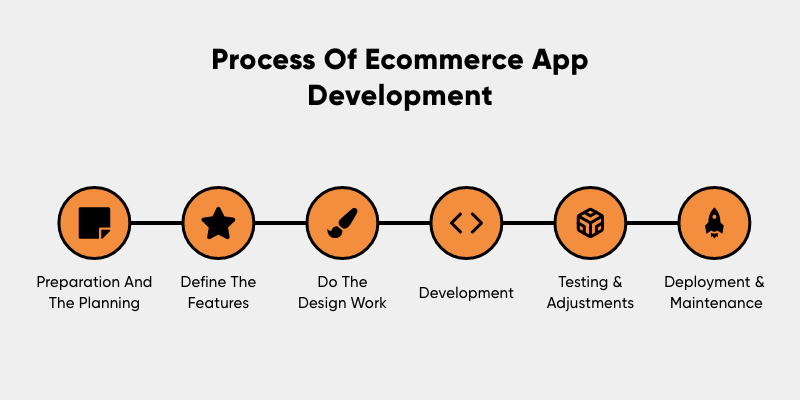
Preparation and the planning
You’ll need to do marketing research, identify general tech requirements for your prospective team, recruit team members, and establish working norms and timelines at this point.
Define the features
Decide on your app’s MVP features, make a list of them, and create a detailed product tech needs document (PRD). Then consider the platform, data frameworks, programming language, and other technologies you’ll require.
Do the design work
What is the best way to create an eCommerce website or a useful application? When it comes to eCommerce, design is everything! Allow your designers to construct a UI wireframe and present it to a group of possible users, focusing on the users’ expectations, concerns, and needs. This stage also includes the creation of UX prototypes. There are a few pointers for an eCommerce app development:
- Simple menu
- Large images
- Significant filters to present products
- Motion design
- Information on prices and payment methods in bold
- Instant notifications
If your business is typical, it may be less expensive to employ pre-made UI templates (local dress store, drugstore).
Development
Developers produce a working prototype (front-end code) of your app at this phase, as well as an API and the back-end architecture of your digital product. All code modules, such as app features or other pieces, should undergo primer quality control. Your top priorities should be security, stability (consider offline capabilities), and scalability. Integration of payment systems is another significant concern at this level.
Testing and adjustments
eCommerce app development testing is difficult since your app requires items to sell (updated database) and your system may encounter an endless number of payment scenarios. After that, start resolving your defects by performing functional, integration, user, and device testing. Make numerous rounds of testing to ensure that everything is in working order.
Deployment and maintenance
Your app can be downloaded from your company’s website, the AppStore, or the Google Play Market. Your marketing approach should have already begun at this point. Respond to customer requests, analyze user experience and analytics, maintain an offer database, and consider missing features.
Cost Of Building An ECommerce App
When you put your finger on the cost of an eCommerce app development, you’ll find a plethora of cost estimates on the internet. But the question is whether those estimates are accurate enough to rely on. How accurate are such estimates in comparison to actual costs?
According to a recent GoodFirms study, the average cost of developing a simple e-commerce app ranges from $38,000 to $91,000. The cost of medium-complexity apps ranges from $55,000 to $131,000, whereas complex apps might cost $91,550 or more.
So, based on the developer’s hourly rate of $30, here’s an approximate estimate of how much it costs to construct an app: A basic app will cost you at least roughly $30,000, a medium complexity app would cost you at least $50,000+, and a complicated app will cost you around $75,000+ or more.
Many of you are wondering why there is such a large difference between each app version and what factors influence the cost of eCommerce app development.
There are a number of factors that influence the eCommerce app development cost, but the most important one is the type of app you want for your business.
Conclusion
After reviewing our eCommerce app development checklist, we believe you are prepared to develop your eCommerce store with all of the necessary aspects in mind. It is essential to double-check your eCommerce app development before releasing it. This eCommerce app development checklist can assist you in going over all aspects of your application again and correcting any issues that arise. This procedure necessitates a thorough understanding of coding and technology. As a result, retailers require assistance from a professional mobile app development company.
You can rely on Echoinnovate IT as a reliable partner to help you resolve issues with your app. With seasoned and talented eCommerce app developers and customer-driven service, we will provide you with the ideal solution for your application and guarantee that it will be completed flawlessly before being advertised.
FAQs
What Are the Best Ecommerce App Monetization Strategies for Your Business?
- Business Monetization Model
- Aggregator Business Model
How Much Does an eCommerce App Cost to Develop?
Based on the developer’s hourly rate of $30, here’s an approximate estimate of how much it costs to construct an app: A basic app will cost you at least roughly $30,000, a medium complexity app would cost you at least $50,000+, and a complicated app will cost you around $75,000+ or more
What are the Major Factors Affecting the Cost to Hire eCommerce App Developers?
- Number of Platforms: Native or Hybrid
- Team Structure: Outsourcing or In-House
- Location of the Development Team
